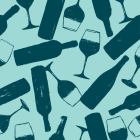Christie’s online auction smashes $1 million
Christie’s latest online fine wine sale brought in a total $1.1 million – an excellent result considering the circumstances, according to the auction house.
Compared to previous online wine sales, the US-based auction saw a 20% increase in unique visitors, with bidders taking part from 31 countries.
The sale’s top lot was a full case of Petrus 1990, which sold for $40,000. Other highlights included a case of Chateau Lafite 2002, which went for $7,500, as well as gems from Rhone, Italy, Champagne and Californian wineries.
Chris Munro, head of wine at Christie’s Americas, said: “A very good sale result, and given the current circumstances, it is an excellent result showing the strength of detailed curation and strong market knowledge.”
Champagne goes from strength to strength
Champagne is enjoying renewed focus in the spotlight following the release of several new figures.
Firstly, the market for investment-grade Champagne in the UK over the past year was “even more buoyant than expected”, according to the Champagne Agents Association, which revealed that the value of growth saw an increase of 6.2% in 2019, taking the total to €431,289,284. Volume has now risen to 27 million bottles.
Meanwhile, Champagne has set a new global turnover record, surpassing €5 billion for the first time in 2019. According to figures from Comite Champagne – which are usually released at ProWein – the region saw a turnover increase of 3.4% on last year’s figure, which itself had been a new record.
Speaking to the drinks business, Comite Champagne co-president Jean-Marie Barillere said that Champagne would likely continue this rise despite setbacks due to the coronavirus. “The long term trend of Champagne in terms of value creation and an understanding of the needs of consumers and our social responsibility in terms of environmental matters means that we are on a very good road for the future,” he said.
“Now we are at war with a virus, so it’s a different world, but the long term track is totally clear for a lot of people in Champagne, and it’s a good one.”
South Africa anticipates ‘exceptional’ vintage
Wines of South Africa (WoSA) says it expects the country’s 2020 harvest to yield “exceptional wines” despite the challenges presented by the coronavirus.
According to the organisation, the harvest is predicted to be smaller than the five-year average of 1.36 million tonnes, but will likely still be higher than the drought-hit 2019 harvest. Wind during the growing and ripening periods has led to smaller berries which will result in good concentrations of colour and flavour, WoSA says.
The South African government initially prohibited wine industry activities until 16th April, but following advocacy by various trade bodies a last-minute concession was made, stipulating that “harvesting and storage activities essential to prevent the wastage of primary agricultural goods” would be considered essential services that could continue during the lockdown.
There remains in place a ban on exports which some analysts claim could have a significant impact on the South African wine industry, however the WoSA remains optimistic. “Once normality returns and we are back to business as usual, our producers will be ready to continue with the sale and promotion of South African wine and hopefully, in years to come, we will remember this period as one that gave us the time for introspection, to regroup and to come back even stronger than we were before,” said CEO Siobhan Thompson.
New technology offers hope for dreaded corked wine
Corked wine could soon be a thing of the past, thanks to innovation from the world’s largest natural cork maker, Amorim.
The Portugal-based company has spent years working on a technology to do away with cork taint’s biggest culprit: TCA, known also as 2,4,6-tribromoanisole.
Speaking to French publication la Revue du Vin de France, Amorim CEO Antonio Amorim said that “from next December, we will be able to guarantee that all the corks coming out of Amorim factories will have a TCA risk equal to zero”.
Amorim already guarantees ‘non-detectable’ status on the corks it makes through its advanced NDtech programme, which is principally used for higher-end wines. Thanks to a new process which makes this existing technology more economically viable for bigger volumes, this non-detectability status will now be rolled out to all corks produced by the company.
Cork taint affects just a minority of wines, although the actual figure has been hotly debated by the wine industry over the years. Some producers have opted for synthetic corks or screwcap closures to help mitigate potential risks, although those seeking to boost their environmental and sustainability credentials often prefer to use traditional cork.
Napa wineries rally to help hospitality workers
Some of the biggest names in Californian winemaking are donating rare and large format bottles to an auction that will support restaurant workers in Napa Valley out of work because of the coronavirus.
Wine Country for Restaurants is a newly-formed charity set up by Bryan Lipa, a former French Laundry sommelier who now runs a boutique wine sales company called Scale Wine Group. After reaching out to his extensive network of connections, he has amassed more than 80 donations, which will be sold at auctions across four weeks.
Lots will include gems from Screaming Eagle Winery, Ovid, Caymus, Clos du Val, Frog’s Leap and others, with 91% of the proceeds from the auctions going to help out-of-work people from the restaurant industry.
Speaking to Wine-Searcher, Lipa said wineries were extremely forthcoming in their donations. "I wasn't surprised because it seems like Napa Valley and Sonoma, they really come together," he said. "To get four large formats from Screaming Eagle, for Harlan to say 'absolutely' before we could finish the sentence, it was great. Everyone wants to be part of this because restaurants are so important to these wineries."
Lots are live now, with each auction open for one week from Sunday until the following Sunday.






